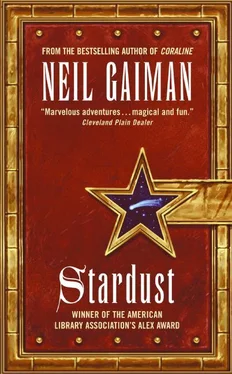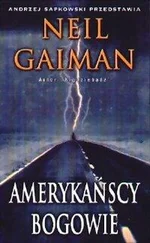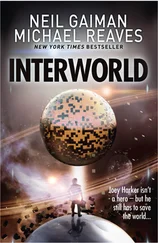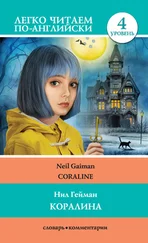Tristran blinked, and reached into the tin bowl and took out a large mushroom between finger and thumb. It was hot. He took a careful bite, felt the juices flood his mouth. It was the finest thing he had ever eaten and, after he had chewed and swallowed it, he said so.
“That’s kind of you,” said the small figure who sat on the other side of a little fire which crackled and smoked in the morning air. “Kind of you, I’m sure. But you know, and / know, that it’s just fried field-mushrumps, and never a patch on nothing proper…”
“Is there any more?” asked Tristran, realizing just how hungry he was: sometimes a little food can do that to you.
“Ah now, that’s manners for you,” said the little figure, who wore a large, floppy hat and a large, flappy overcoat. “Is there more? he says, as if it were poached quail’s eggs and smoked gazelle and truffles, not just a mushrump, what tastes more or less like something what’s been dead for a week and a cat wouldn’t touch. Manners.”
“I really, truly would like another mushroom,” said Tris-tran, “if it’s not too much trouble.”
The little man—if man he was, which Tristran found rather unlikely—sighed mournfully, and reached into the pan sizzling on the fire, with his knife, and flicked two large mushrooms into Tristran’s tin bowl.
Tristran blew on them, then ate them with his fingers. “Look at you,” said the little hairy person, his voice a mixture of pride and gloom, “eatin’ those mushrumps as if you liked them, as if they wasn’t sawdust and wormwood and rue in your mouth.”
Tristran licked his fingers, and assured his benefactor that they had been the very finest mushrooms he had ever had the privilege of eating.
“You says that now,” said his host with gloomy relish, “but you’ll not be sayin’ that in an hour’s time. They’ll undoubtedly disagree with you, like the fishwife who disagreed with her young man over a mermaid. And that could be heard from Garamond to Stormhold. Such language! It fair turned my ears blue, it did.” The little hairy personage sighed deeply. “Talkin’ about your guts,” he said, “I’m going to attend to mine behind that tree over there. Would you do me the signal honor of keepin’ an eye on that there pack of mine? I’d be obliged.”
“Of course,” said Tristran, politely. The little hairy man vanished behind an oak tree; Tristran heard a few grunts, and then his new friend reappeared, saying, “There. I knowed a man in Paphlagonia who’d swallow a live snake every morning, when he got up. He used to say, he was certain of one thing, that nothing worse would happen to him all day. ‘Course they made him eat a bowlful of hairy centipedes before they hung him, so maybe that claim was a bit presumptive.”
Tristran excused himself. He urinated against the side of the oak tree, next to which was a small mound of droppings, certainly not produced by any human being. They looked like deer pellets, or rabbit-droppings.
“My name is Tristran Thorn,” said Tristran, when he returned. His breakfast companion had packed up the morning’s breakfast—fire, pans and all—and made it vanish into his pack.
He removed his hat, pressed it to his chest, and looked up at Tristran. “Charmed,” he said. He tapped the side of his pack: on it was written: charmed, enchanted, ensorcel-led and confusticated. “I used to be confusticated,” he confided, “but you know how these things go.”
And with that he set off along the path. Tristran walked behind him. “Hey! I say!” called Tristran. “Slow down, can’t you?” For despite the huge pack (which put Tristran in mind of Christian’s burden in Pilgrim’s Progress, a book from which Mrs. Cherry had read to them every Monday morning, telling them that, although it was written by a tinker, it was a fine book for all of that) the little man—Charmed? Was that his name?—was moving away from him as fast as a squirrel up a tree.
The little creature hurried back down the path. “Some-thin’ wrong?” he asked.
“I cannot keep up,” confessed Tristran. “You walk so confoundedly fast.”
The little hairy man slowed his pace. “Beg your puddin’,” he said, as Tristran stumbled after him. “Bein’ on me own so much, I gets used to settin’ me own pace.”
They walked side by side, in the golden-green light of the sun through the newly opened leaves. It was a quality of light Tristran had observed, unique to springtime. He wondered if they had left summer as far behind as October. From time to time Tristran would remark on a flash of color in a tree or bush, and the little hairy man would say something like, “Kingfisher. Mr. Halcyon they used to call him. Pretty bird,” or “Purple hummingbird. Drinks nectar from flowers. Hovers,” or “Redcap. They’ll keep their distance, but don’t you go scrutinizin’ ‘em or looking for trouble, ‘cos you’ll find it with those buggers.”
They sat beside a brook to eat their lunch. Tristran produced the cottage loaf, the ripe, red apples, and round of cheese—hard, tart and crumbly—that his mother had given him. And although the little man eyed them both suspiciously, he wolfed them down and licked the crumbs of bread and cheese from his fingers, and munched noisily on the apple. Then he filled a kettle from the brook, and boiled it up for tea.
“Suppose you tell me what you’re about?” said the little hairy man as they sat on the ground and drank their tea.
Tristran thought for some moments, and then he said, “I come from the village of Wall, where there lives a young lady named Victoria Forester, who is without peer among women, and it is to her, and to her alone, that I have given my heart. Her face is—”
“Usual complement of bits?” asked the little creature. “Eyes? Nose? Teeth? All the usual?”
“Of course.”
“Well then, you can skip that stuff,” said the little hairy man. “We’ll take it all as said. So what damn-fool silly thing has this young lady got you a-doin’ of?”
Tristran put down his wooden cup of tea, and stood up, offended.
“What,” he asked, in what he was certain were lofty and scornful tones, “would possibly make you imagine that my lady-love would have sent me on some foolish errand?”
The little man stared up at him with eyes like beads of jet. “Because that’s the only reason a lad like you would be stupid enough to cross the border into Faerie. The only ones who ever come here from your lands are the minstrels, and the lovers, and the mad. And you don’t look like much of a minstrel, and you’re—pardon me saying so, lad, but it’s true– ordinary as cheese-crumbs. So it’s love, if you ask me.”
“Because,” announced Tristran, “every lover is in his heart a madman, and in his head a minstrel.”
“Really?” said the little man, doubtfully. “I’d never noticed. So there’s some young lady. Has she sent you here to seek your fortune? That used to be very popular. You’d get young fellers wanderin’ all over, looking for the hoard of gold that some poor wyrm or ogre had taken absolute centuries to accumulate.”
“No. Not my fortune. It was more of a promise I made to this lady I mentioned. I… we were talking, and I was promising her things, and we saw this falling star, and I promised to bring it to her. And it fell…” he waved an arm toward a mountain range somewhere in the general direction of the sunrise “… over there.”
The little hairy man scratched his chin. Or his muzzle; it might well have been his muzzle. “You know what I would do?”
“No,” said Tristran, hope rising within him, “what?”
The little man wiped his nose. “I’d tell her to go shove her face in the pig pen, and go out and find another one who’ll kiss you without askin’ for the earth. You’re bound to find one. You can hardly throw half a brick back in the lands you come from without hittin’ one.”
Читать дальше








